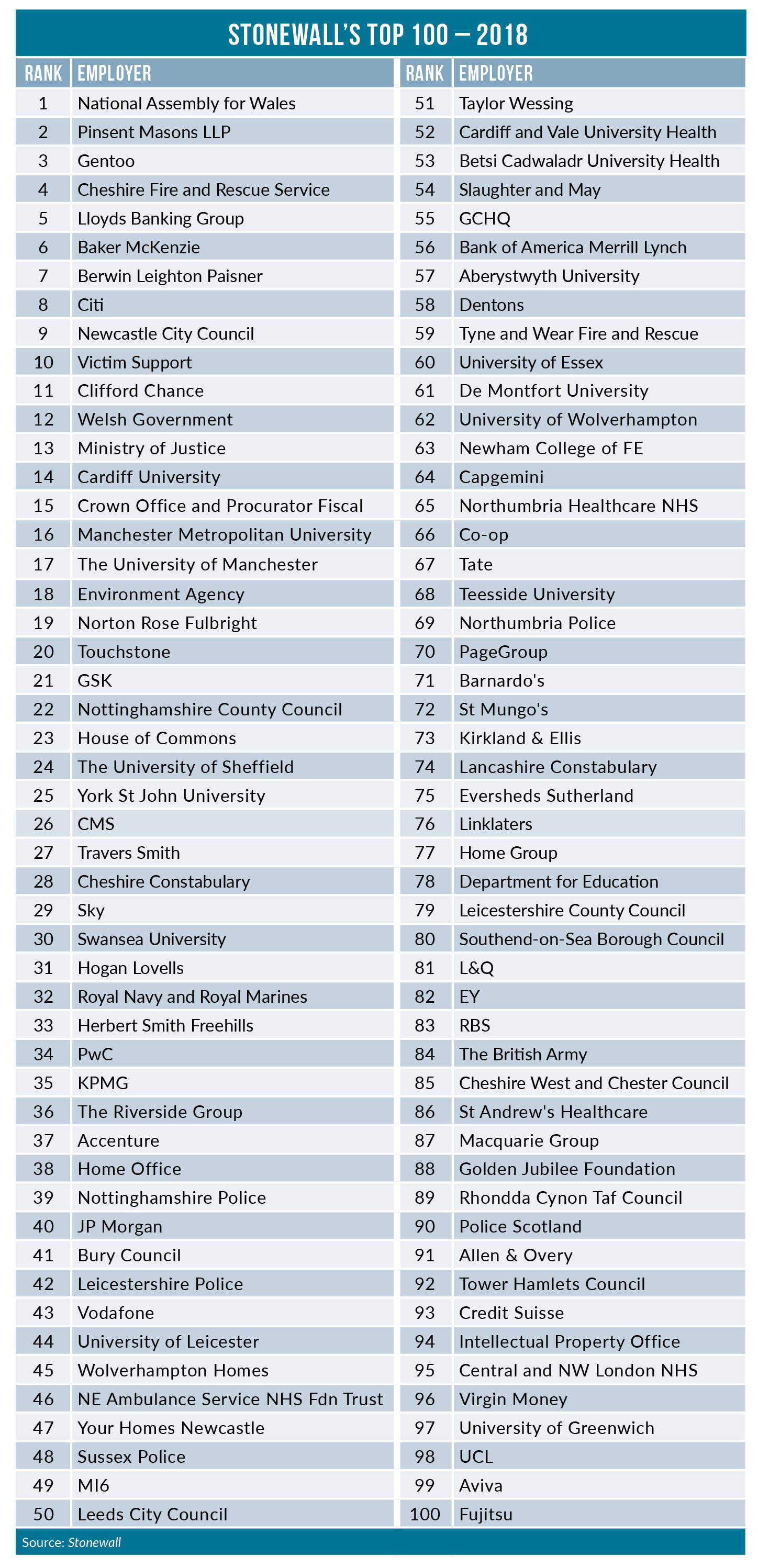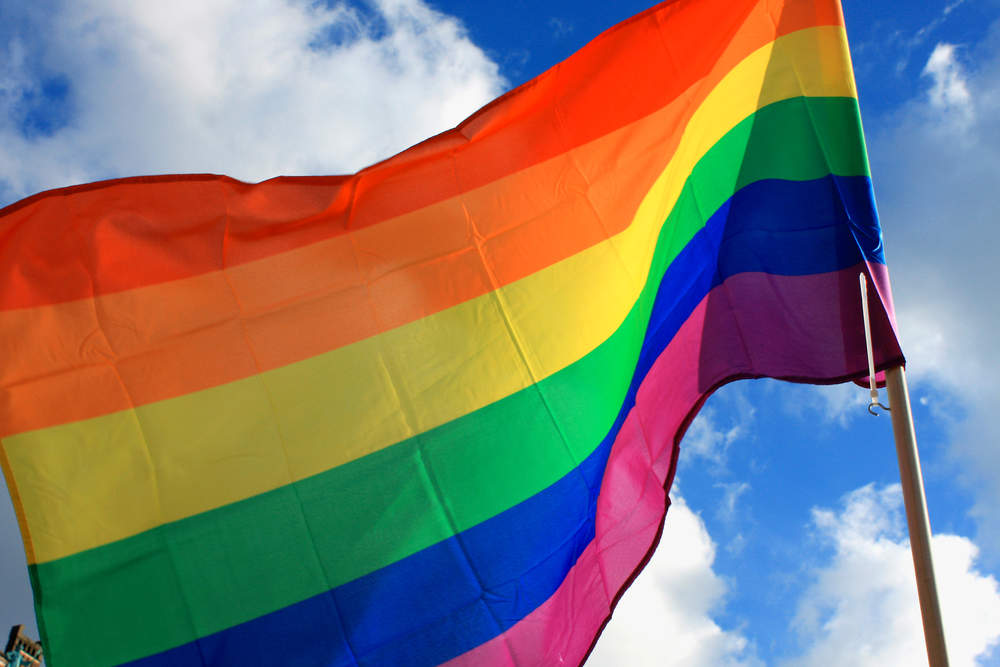
Stonewall has released its top 100 employers for 2018, celebrating those who have made positive steps forward in creating a safe and open work environment for LGBT employees – but where are the banks? asks Briony Richter
It has been over 50 years since the Sexual Offences Act in 1967, but has there really been enough progress?

Access deeper industry intelligence
Experience unmatched clarity with a single platform that combines unique data, AI, and human expertise.
Building an inclusive culture within the work place is a journey that requires a functioning network with clear aims and a continued dialogue so everyone can communicate positively.
Achieving top spot on Stonewall’s 2018 list the list is the National Assembly for Wales. It was praised for continuing to be active in promoting LGBT rights by introducing a number of changes, such as offering an Mx title as opposed to the traditional Mr, Mrs or Ms. But where are the banks? With only five making the list, one has to wonder why banks are falling short in this area.
Lloyds Banking Group can take a round of applause for achieving fifth place. The banking group has featured in the top 100 in previous years. Citi followed close behind Lloyds, placing at number eight. JP Morgan Chase & Co, Bank of America Merrill Lynch and RBS hold places 39, 56 and 83 respectively. Credit Suisse placed at 93.
For employees who do not feel confident enough to express their true identity, an unhealthy amount of time is spent hiding their sexual orientation. This does not just have a harmful effect on the employee, but also negatively impacts their work relationships.

US Tariffs are shifting - will you react or anticipate?
Don’t let policy changes catch you off guard. Stay proactive with real-time data and expert analysis.
By GlobalDataLloyds Banking Group
Lloyds has been recognised by Stonewall for its continuing efforts to stand beside the LGBT community at work. The banking group boasts a range of inclusive policies including advertisements such as This is who I am. Lloyds’ Rainbow network plays a critical role in the bank’s approach to achieving a fully inclusive environment. By 2020, the banking group aims to increase the engagement scores of its LGBT colleagues to 70%.
Fiona Cannon, Lloyds Banking Group’s director of responsible business and inclusion, comments: “We are delighted to retain our position of Top Financial Services Employer for a fourth consecutive year, and remain a leading organisation in the Stonewall Top 100 employers list.
“We know how important it is for our colleagues and customers to feel included and that the group is a place where everyone feels comfortable to be their true self.”
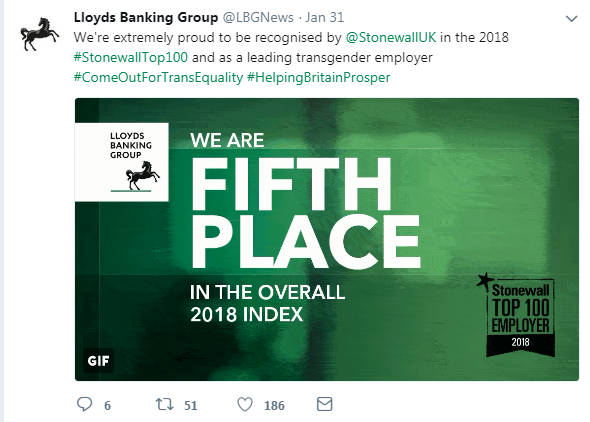
Positive role models
Role models in the workplace are consistently recognised for having a powerful influence within the LGBT community.
Proving this is Citi’s director and global head of operational regulatory change, Clare Eastburn. Citi achieved eighth place on the list, significantly improving its performance in previous years – up 23 places from 2017 and 92 places from 2016. Eastburn was named Bi Role Model of the Year by Stonewall, and is co-chair of Citi’s Pride network in London and the committee’s bisexual representative.
Bank of America took 56th place. Daniel South, head of diversity & inclusion EMEA (Europe, the Middle East & Africa), highlights BofA’s efforts: “Diversity & Inclusion (D&I) are embedded in everything we do. Specific goals and metrics are included in all business plans and reviewed with leaders throughout the year. Annually we conduct an Employee Satisfaction Survey which serves as a key measure for our leaders and HR teams.
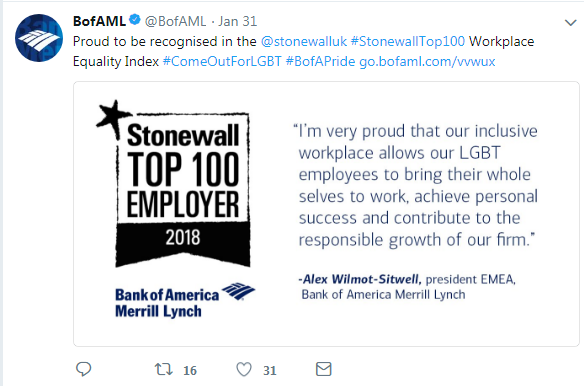
“Building on our existing global Ally programme, and based on feedback from several Allies, in May 2016 we launched a new web-based Ally Engagement Portal where employees can learn about what it means to be an Ally or to be out at work, and how to move forward in the journey to become an LGBT advocate or champion.”
Furthermore, BofA’s CEO has chaired its Global Diversity & Inclusion Council (GDIC) for 10 years. First established in 1993, the GDIC is comprised of leaders representing every line of business and geography. The council aims to provide strategic direction on how to better improve Diversity & Inclusion (D&I) as a company.
A long history of supporting the LGBT community, BofA is continually involved in external conferences and activities, promoting acceptance and equality, such as the Stonewall Workplace Conference, OutLeadership and Out & Equal.
Room for improvement
According to an employee feedback survey conducted by Stonewall, only 25% of lesbian, gay and bisexual respondents note that they would feel comfortable disclosing their sexual identity to everyone at work; 6% say they would not feel comfortable enough to tell anyone at work.
HSBC did not appear on the list, but a bank spokesperson says: “We believe that a diverse and inclusive workforce is critical to running a sustainable and successful business. We continue to make great strides in LGBT+ inclusion, building a connected and collaborative workforce that reflects the customers we serve and the communities in which we operate.”
Santander did not submit for this year’s Stonewall Top 100. However, Jessica Chu, head of diversity and inclusion, speaks about the bank’s commitment to the LGBT workforce: “We established Santander UK’s LGBT+ network, Embrace, in 2014; since then it has grown exponentially to around 2,000 members. Santander has strict policies around bullying and harassment that include sexual orientation and we have also launched our Gender Identity & Expression Policy, which includes a pioneering ‘transitioning at work’ guide.
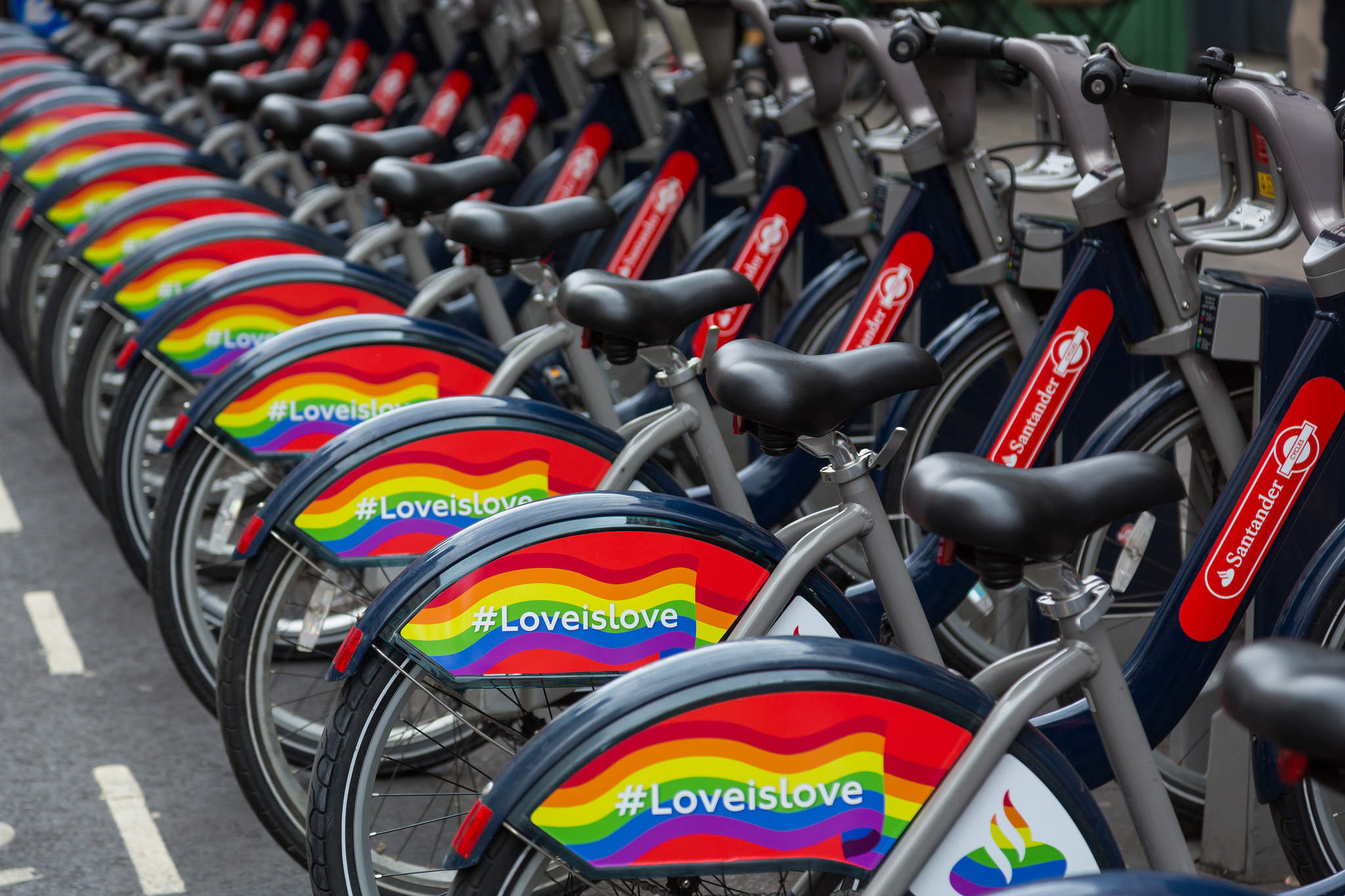
“In 2017, Santander participated in seven national Pride festivals, and decorated branches in key locations with rainbow LGBT+ pride flags. We also supported Pride in London with the launch of 50 Santander Cycles with rainbow livery,” Chu adds.
LGBT employees constitute a sizable workforce population. To fully embrace a diverse workforce, banks and financial institutions must reflect on their responsibilities to all employees, regardless of sexual orientation and create a work environment where different voices are not just heard, but encouraged.
